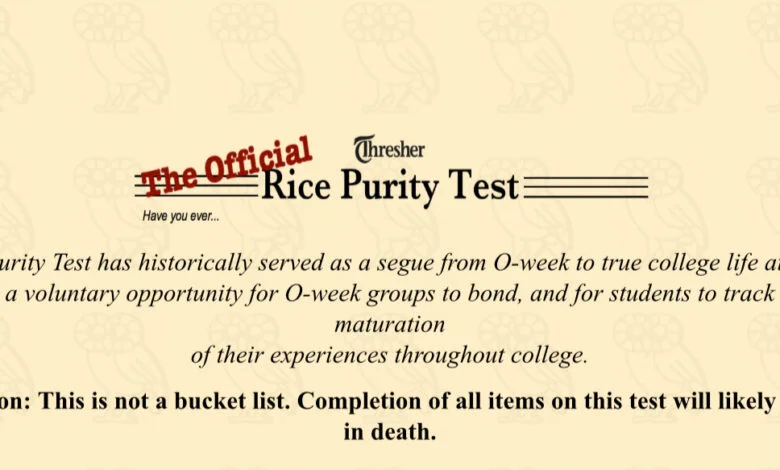
Understanding the Iow Rice Purity Tesy A Deep Dive into Its Origins and Implications
Have you ever come across the term “Iow Rice Purity Tesy” and wondered what it’s all about? This quirky questionnaire has captured the attention of many, especially among college students. It’s more than just a fun pastime; it’s a reflection of societal values regarding purity and personal experiences. With its origins steeped in tradition and evolving through generations, this test sparks curiosity and conversation. So, why do people flock to it? What does their score really mean? Let’s embark on an insightful journey to uncover the layers behind the Iow Rice Purity Tesy and its implications in today’s world.
The History and Evolution of the Tesy
The Iow Rice Purity Tesy has roots that trace back to the late 20th century. Initially, it was created as a simple questionnaire for college students to reflect on their life experiences.
Over time, its popularity soared through word of mouth and social media platforms. The format evolved from paper-and-pencil quizzes to digital forms easily shared among peers. This shift made it accessible and appealing to younger generations.
As culture changed, so did the test’s perception. What started as a lighthearted activity began sparking deeper discussions about morality and personal choices in relationships.
Today, many see the test not just as a game but also as a lens into societal values around purity and experience. Its evolution reflects shifting attitudes toward intimacy, making it relevant in contemporary conversations about ethics and identity among young adults.
What Does the Score Mean?
The Iow Rice Purity Tesy score ranges from 0 to 100. A higher score suggests a more “innocent” experience, while a lower score implies exposure to various life experiences.
Each question on the test touches on different aspects of relationships, substance use, and personal behavior. For instance, engaging in activities like drinking or dating can influence your final tally significantly.
A perfect score of 100 means you haven’t engaged in any of the listed behaviors. On the other hand, a score closer to zero indicates significant experiences that some might consider less pure.
It’s essential to remember that these scores are subjective. They reflect personal choices rather than moral judgments. The numbers may spark curiosity or lead to deeper conversations about values and societal expectations surrounding purity and experience.
Criticisms and Controversies Surrounding the Test
The Iow Rice Purity Tesy has sparked debate since its inception. Critics argue that it oversimplifies complex human experiences into a mere number. This reductionist approach can be misleading and harmful.
Many believe the test perpetuates unrealistic standards. Those who score low might feel ostracized or judged, fostering an environment of shame rather than understanding.
Moreover, the cultural implications cannot be ignored. Different backgrounds influence perceptions of purity, leading to significant biases in how scores are interpreted.
Some advocate for more inclusive discussions about personal experiences instead of rigid scoring systems. The focus on purity may overshadow important conversations about consent and individual choice.
This controversy highlights broader societal issues surrounding morality and sexual behavior—topics that deserve nuanced dialogue rather than quick assessments through tests like this one.
Why Do People Take It?
Many individuals take the Iow Rice Purity Tesy out of curiosity. They want to gauge their life experiences compared to peers. It serves as a fun icebreaker in social settings.
For some, it’s about self-reflection. The test prompts users to think critically about their choices and relationships. A low score can spark introspection regarding personal values.
There’s also a playful aspect involved. Friends often challenge each other for laughs or bragging rights based on scores. Sharing results creates camaraderie among participants, fostering shared stories and laughter.
Additionally, younger generations are drawn to online trends and challenges. The test’s viral nature on social media encourages participation without much thought behind its implications.
Many see it as harmless entertainment—a light-hearted way to engage with friends while exploring themes of innocence and experience in modern life.
Alternatives to the Iow Rice Purity Tesy
Exploring alternatives to the Iow Rice Purity Tesy can offer fresh perspectives on personal experiences and values. Many individuals seek out quizzes that focus on emotional intelligence, self-awareness, or relationship dynamics instead of purely numerical scores based on life experiences.
Online personality tests like the 16 Personalities test or Enneagram assessments provide insights into one’s character traits and tendencies. These options encourage deeper introspection rather than a simple tally of actions.
Additionally, some people find value in journaling prompts related to personal growth. Writing about significant life events fosters understanding and reflection without reducing one’s identity to a single score.
Group discussions around purity culture also serve as an alternative. Engaging in conversations with peers can help unravel complexities surrounding societal expectations while promoting mutual support and learning.
Conclusion: The Impact and Importance of Discussing Purity in Our Society
The Iow Rice Purity Tesy has sparked conversations about the concept of purity in our society. It serves as a reflection of cultural values and social norms, often prompting individuals to think critically about their experiences.
Discussing purity can open up avenues for deeper understanding and empathy. It challenges people to consider how personal choices shape identity and community perception. This dialogue is vital in an age where social media amplifies both judgment and celebration of individual life paths.
As we navigate this complex landscape, it becomes essential to approach discussions on purity with sensitivity and openness. The implications extend beyond the test itself; they touch upon self-acceptance, societal pressures, and the quest for authenticity in a world that often places value on appearances.
Engaging with tools like the Iow Rice Purity Tesy encourages us to reflect not only on ourselves but also on how we relate to others within our communities. Emphasizing meaningful connections over numerical scores helps foster more inclusive spaces where everyone’s journey is respected.

